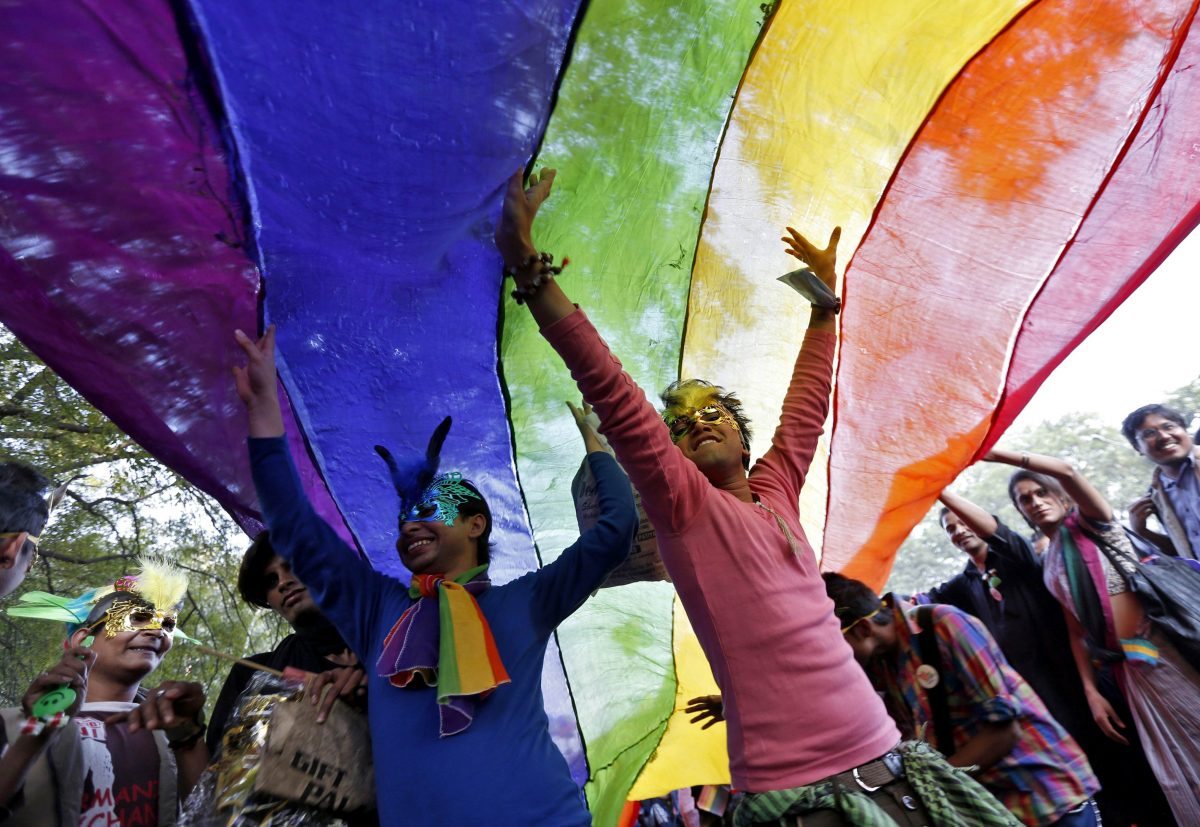India's Supreme Court last week reversed a landmark 2009 lower court order that had decriminalized gay sex. The country's gay community is demanding that the government take immediate action to remove the colonial-era law banning same-sex relations.
The Repeal of Section 377: India Regresses to its Colonial Roots.
India’s Supreme Court repealed the 2009 Delhi High Court’s ruling of 1861 Colonial law (Section 377 of the Indian Penal Code) placing the decision to legalize homosexuality solely in the hands of the government. Justice GS Singhvi of the two-judge Supreme Court bench stated that “the legislature must consider deleting this provision (Section 377) from law as per the recommendations of the attorney general.”
Meanwhile, the sudden and unexpected criminalization of homosexuality has sparked outrage across the nation and the world, especially since India’s Supreme Court has a history of upholding progressive rights judgments in the past, often in direct opposition of governmental decisions.

South Asian director of Human Rights Watch, Meenakshi Guanguly, released an official statement:“the Supreme Court, by reversing the 2009 Delhi High Court ruling that decriminalized same-sex conduct between consenting adults, failed to recognize everyone’s internationally protected right to privacy and non-discrimination,” and urges Indian government to join other Commonwealth states like Australia and New Zealand in abolishing this outdated law.
LGBT activists plan to challenge the ruling, but the final decision lies in New Delhi. The government’s views are changing, with many of its employees making the case that Section 377 is archaic and vague, and that Indian society has grown progressively tolerant to homosexuality. However, India’s upcoming elections mean that the coalition government will desperately try to stay in power. It’s likely that the Parliament won’t be addressing the matter any time soon.
In 2008 the United Nations told India that by decriminalizing homosexuality, legal intervention programs could address HIV/AIDS, and to date, the cases of HIV infections have halved. India’s LGBT activists, who have campaigned for decades for acceptance in India’s deeply conservative society, have words for the decision: “retrograde, regressive and revolting.” However, the Supreme Court judges urge people to read the decision to better understand its implications, both positive and negative.
What is Section 377?
Officially it states:
“Unnatural offences: Whoever voluntarily has carnal intercourse against the order of nature with any man, woman or animal, shall be punished with imprisonment for life, or with imprisonment of either description for term which may extend to ten years, and shall also be liable to fine.”
Explanation: Penetration is sufficient to constitute the carnal intercourse necessary to the offense described in this section.

Why Section 377 is Outdated?
“Officially” Section 377 prohibits anything other than the traditional sexual intercourse between a man and woman. What does that mean for the non-tradiional and sexual acts between same sex couples? According to this law they’re technically illegal.
What Was The Court’s Rational Behind Wednesday’s Decision?
When they reviewed the case, the Indian Supreme Court unsuccessfully searched for a “uniform test” to legally classify the sort of sexual acts or deviancies that qualify as ‘carnal intercourse against the order of nature’. Justices G S Singhvi and S J Mukhopadhaya failed to find any previous judgment norms from cases dating back to 1925 to now that would constitute the core of Section 377.
However, there was one strong factor that stood out in each case: the sexual act in each situation was non-consensual, leading the judges to their decision that: “the acts which fall within the ambit of the section can only be determined with reference to the act itself and the circumstances in which it is executed," the bench said.
What does this mean for Indian Citizens?
This means that all cases that pass before the courts are still reviewed individually, on a case-by-case basis. Cases that may or may not violate Section 377 are measured against previous cases and then the court decides before a final verdict is made.
On the bright side, this means that rape, non-consensual sex crimes and police brutality (many times sexual in nature) can be prosecuted more easily.
On the downside, Section 377 does class homosexuality as illegal, leaving the LGBT at the mercy of the courts. The government can chose to enforce punishment if they so choose. Same sex couples taking part in sexual intercourse is now considered an offense punishable by up to life imprisonment, even if the individual is a peace-loving, law-abiding citizen. Additionally, because homosexuality is now technically illegal, the government does have the option to cut financial support given to the LGBT community, for instance: LGBT HIV/AIDS medical support. What will happen as a result of this decision is yet to be seen, but for over 2 million people the future seems pretty grim.
 An interesting turn of events took place in Toronto when a 32-year-old sikh guy, Kanwar Anit Singh Saini posted on his Facebook page, “Sikh Knowledge,” this photo of him kissing a man during a Global Day of Rage protest against India’s ruling criminalizing homosexuality on Sunday.
An interesting turn of events took place in Toronto when a 32-year-old sikh guy, Kanwar Anit Singh Saini posted on his Facebook page, “Sikh Knowledge,” this photo of him kissing a man during a Global Day of Rage protest against India’s ruling criminalizing homosexuality on Sunday.
With it he wrote,
"Last night my uncle told me if they knew i was gay before 20 they would have killed me. He also said im gay cause i was molested as a kid and im on "the wrong path"…and when was i getting married?… i laughed and hung up. He comes from the same backwards place a whole minority were just recriminalized … F*** my uncle. F*** section 377. Im very proud to be illegal in any context. I owe that to my sikhi heritage and my mom. Also, for all the ranting about genocide i hear…i rarely see solidarity. So…f*** em all. #sikhknowledge #baagi #377 #section377 xoxox," wrote Saini.
Facebook took the photo down stating it “violates our terms and policies.” which fuelled more outrage and the picture was shared on various social networks and gay websites critizing Facebook's policies. On Tuesday, Facebook reposted the picture without any clarification.
As reported in Buzz Feed Saini said he tries not to interact with trolls who hate on his page. He says he likes to make statements to “neutralize” all the “disdain” he gets from homophobes.
“How often do you see a guy in a turban not flinching to make out with another dude? Uhh never. So… bun down the system”
What do you think of India's decision? Drop us a line or tweet us your comments @ANOKHI_Media
Featured Image: aljazeera.com
Image 1: timesofindia.indiatimes.com
Image 2: http://world.time.com
Image 3: bbc.co.uk
Image 4:Buzzfeed.com
Source: TimesofIndia.com, BBc.co.uk, IBN.com, NDTV.com, Buzzfeed.com


















































































































